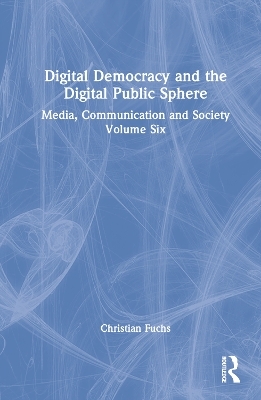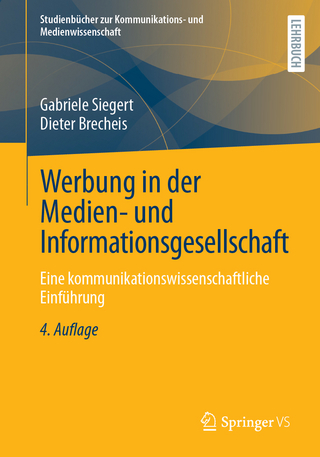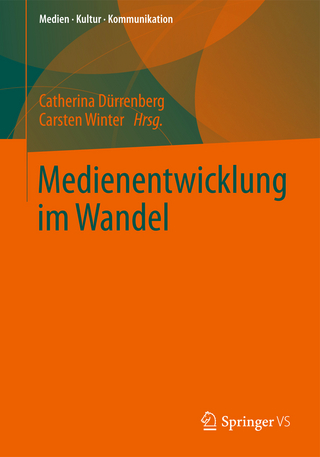
Digital Democracy and the Digital Public Sphere
Routledge (Verlag)
978-1-032-36273-1 (ISBN)
This sixth volume in Christian Fuchs' Media, Communication and Society series draws on radical Humanist theory to address questions around the digital public sphere and the challenges and opportunities for digital democracy today.
The book discusses topics such as digital democracy, the digital public sphere, digital alienation, sustainability in digital democracy, journalism and democracy, public service media, the public service Internet, and democratic communications. Fuchs argues for the creation of a public service Internet run by public serviceMedia that consists of platforms such as a public service YouTube and Club 2.0, a renewed digital democracy and digital public sphere version of the legendary debate programme formats Club 2 and After Dark.
Overall, the book presents foundations and analyses of digital democracy that are interesting for both students and researchers in media studies, cultural studies, communication studies, political science, sociology, Internet research, information science, as well as related disciplines.
Christian Fuchs is a critical theorist of communication and society. He is Chair Professor of Media Systems and Media Organisation at Paderborn University’s Department of Media Studies. He is co-editor of the journal tripleC: Communication, Capitalism & Critique. He is the author of many publications, including the books Digital Capitalism (2022), Foundations of Critical Theory (2022), Communicating COVID-19: Everyday Life, Digital Capitalism, and Conspiracy Theories in Pandemic Times (2021), Marxist Humanism and Communication Theory (2021), Social Media: A Critical Introduction (3rd edition, 2021), Communication and Capitalism: A Critical Theory (2020), Marxism: Karl Marx’s Fifteen Key Concepts for Cultural and Communication Studies (2020), Nationalism on the Internet: Critical Theory and Ideology in the Age of Social Media and Fake News (2020), Rereading Marx in the Age of Digital Capitalism (2019), Digital Demagogue: Authoritarian Capitalism in the Age of Trump and Twitter (2016), Digital Labour and Karl Marx (2014), and Internet and Society (2008).
I. Introduction 1. Democracy, Communicative Democracy, Digital Democracy II. Foundations of Digital Democracy 2. The Dialectic: Not Just the Absolute Recoil, but the World’s Living Fire that Extinguishes and Kindles Itself: Reflections on Slavoj Žižek’s Version of Dialectical Philosophy in Absolute Recoil:Towards a New Foundation of Dialectical Materialism 3. The Critique of the Political Economy of the Media and Communication 4. Power in the Age of Social Media 5. The Praxis School’s Marxist Humanism and Mihailo Marković’s Theory of Communication 6. Sustainability and Community Networks 7. Karl Marx, Journalism, and Democracy 8. Towards a Critical Theory of Communication as Renewal and Update of Marxist Humanism in the Age of Digital Capitalism 9. Digital Democracy, Public Service Media, and the Public Service Internet III. Conclusion 10. The Structural Transformation of the Public Sphere and Alienation: Challenges and Opportunities for the Advancement of Digital Democracy
| Erscheinungsdatum | 11.11.2022 |
|---|---|
| Zusatzinfo | 25 Tables, black and white; 3 Line drawings, black and white; 14 Halftones, black and white; 17 Illustrations, black and white |
| Verlagsort | London |
| Sprache | englisch |
| Maße | 156 x 234 mm |
| Gewicht | 748 g |
| Themenwelt | Geisteswissenschaften ► Geschichte |
| Sozialwissenschaften ► Kommunikation / Medien ► Kommunikationswissenschaft | |
| Sozialwissenschaften ► Kommunikation / Medien ► Medienwissenschaft | |
| ISBN-10 | 1-032-36273-1 / 1032362731 |
| ISBN-13 | 978-1-032-36273-1 / 9781032362731 |
| Zustand | Neuware |
| Informationen gemäß Produktsicherheitsverordnung (GPSR) | |
| Haben Sie eine Frage zum Produkt? |
aus dem Bereich


